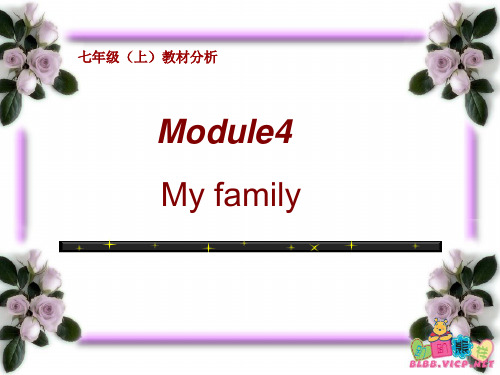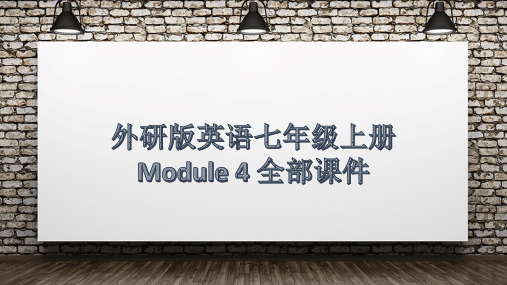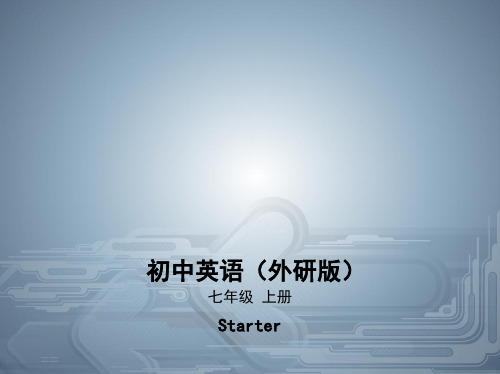七年级英语上学期module4外研英语
外研版英语七年级上第四模块教材分析

教学重点、 四.教学重点、难点 教学重点
教学重点: 教学重点:
Key vocabulary—email, him, have got, uncle Key structures---there is/are… I have got…
教学难点: 教学难点:
have/has got 和there be 句型的区别。 句型的区别。
5. small 与 little 区别 都含有“ 的意思。 主要强调形状、 (1)small和little 都含有“小”的意思。但small主要强调形状、面积等小, ) 和 主要强调形状 面积等小, 它不含有任何的感情色彩。 它不含有任何的感情色彩。 Eg: The box is too small. 这个盒子太小。 这个盒子太小。 主要指年龄小,含有很强的感情色彩, (2)little 主要指年龄小,含有很强的感情色彩,主观上表示对人或某种小 ) 动物含有喜爱之意。 动物含有喜爱之意。 Eg: The little girl is Mr Wang’s daughter. 那个小女孩是王先生的女儿。 那个小女孩是王先生的女儿。 6. Thank you for your email. 谢谢你的电子邮件。 谢谢你的电子邮件。 短语: 短语:Thank you for… 剖析: 表示……而感谢你。” 介词 而感谢你。 介词for 后可以接名词、代词或动词的 后可以接名词、代词或动词的-ing 剖析: “表示 而感谢你 形式。其另一种表达方式是Thanks for…。 形式。其另一种表达方式是 。 Eg: Thanks/Thank you for helping me. 谢谢你对我的帮助。 谢谢你对我的帮助。 thanks for 与thanks to的区别 的区别 因某事而感激某人” 表示对对方的行为表示感谢。 (1)thanks for 是“因某事而感激某人”,表示对对方的行为表示感谢。 ) 则表示“由于,多亏” (2)thanks to 则表示“由于,多亏”,其中的介词短语在句中作原因状 ) 常位于句首。 语,常位于句首。
外研版七年级英语上册课件 Module4 Unit1

Let’s look and say! We have got some fruit. = We’ve got some fruit.
an orange
oranges /z/
an apple /'æpl/
Make a shopping list
Things Tony’s family has got at home
Food
Drink
×
chocolate Things Tony’s
apples family hasn’t
meat
got at home
chicken oranges
orange juice coffee
OK. Have we got any ____?
Yes, we have. ____ ______ chocolate isn't ____ for you. Let's get some _____.
What kind of fruit? ____?
No, we've got __ __ apples. We haven't got any _____, so let's get ________.
apples /z/
We have got some vegetables. = We’ve got some vegetables.
a carrot
['kærət]
a tomato a potato
[tə'mɑ:təu] [pə'teitəu]
beans
七年级英语上册Module4教案外研版

七年级英语外研版(上)学案Module 4 My family一、学习目标:1.单词和短语:many , people , aunt , grandfather , grandmother , grandparent , uncle , have got , email , him2.交际用语:1) How many people are there in your family ? 你们家有多少人?2) Thank your for your email . 谢谢你的电子邮件。
3) We’ve got a small family . 我们有个小家庭。
4) — Have you got any brother ? 你有兄弟吗?— Yes , I have . / No , I haven’t . 是的,我有。
/ 不,我没有。
5) He hasn’t got any brothers . 他没有兄弟。
3. 语法:have / has got 的用法。
二、重点及难点:there be 与 have/has , have /has got 的区别三、学习步骤:Unit 1 How many people are there in your family ? 一)自主学习A. 写出一组你能够想到的关于家庭成员的词汇(至少10个)____________________________________________________________________________________________________________________________________________________________________________________________________________________________________________________________________ Answers:father , mother , brother , sister , uncle , aunt , grandfather , grandmother , parents , grandparents , grandson , granddaughter , wife , husbandB .Look at the pictures . Label Tony’s family .aunt , brother , father , grandfather , grandmother , grandparents , mother , parents , sister , uncleAnswers:1. grandmother2. grandfather3. grandmother4. grandfather5. uncle6. aunt7. mother8. father9. uncle 10. sister二)知识点学习1. family home和house的区别1) family的意思是“家庭、家庭成员”,与居住的房子无关。
2022年外研版七年级英语上册Module4Healthyfood词汇篇试题附答案

Module 4词汇篇__________________________________________________________________________________ __________________________________________________________________________________1.熟练掌握重点单词、词组的用法“饮食〞相关的表达1. drink n.饮料,不可数名词,还有如下用法:〔1〕drink 指不同种类的饮料时,是可数名词。
Milk and juice are healthy for us. 牛奶和果汁对我们的健康是有益的。
〔2〕drink 还可指“一杯/一份〔饮料〕〞。
Let’s have a drink.我们一起喝一杯吧。
2. much adj.许多的,大量的,其后接不可数名词,其反义词为little。
too much 意为“太多〞,常用来修饰不可数名词too many 意为“太多〞,常用来修饰可数名词3. kind n.品种,种类,可数名词。
拓展---相关短语〔1〕 a kind of 一种An apple is a kind of fruit. 苹果是一种水果。
〔2〕 all kinds of 各种各样的I love all kinds of sports. 我喜欢各种各样的运动。
4. or conj. 或者;还是,or连接并列主语时,谓语动词要与最后的那个主语保持一致。
Which do you prefer, lamb chops or pork chops 你比拟喜欢小羊排,还是猪排辨析:and/or,and意为“并且〞,or意为“或者,否那么〞,做“和,并且〞讲时常用于否认句中。
I don't like apples or bananas. 我不喜欢苹果和香蕉。
5. remember v. 记住;想起相关句型:〔1〕remember to do sth. 记着去做某事Remember to write us when you get there. 到了那儿别忘了给我们写信。
外研版七年级英语上册《Module 4 Healthy food Unit 3 Language版

14. chocolate 巧克力 15. fish 鱼肉
16. cheese 奶酪
17. sugar 糖
18. candy 糖果
19. soup 汤
C.可数名词的特殊变化:
1. child—children 孩子
2. tooth—teeth 牙齿
Complete the sentences with the words
B.完成句子: 1.你最喜欢的食物和饮料是什么?
What _is__y_o_u_r_f_a_v_o_u_r_it_e__ food and drink? 2.多喝水是非常重要的。
It’s very _im__p_o_r_ta_n__t _to__d_r_in__k more water. 3.牛奶、奶酪和鱼对你的牙齿有益。
4.A__re_ _t_h_e_re_ any cakes in your bag? 5. _H__a_v_e you _g_o_t_ a white shirt?
同步P36
A) 构成方法及读音规则
1) 一般情况加 –s:map-maps boy-boys
清辅音后读
浊辅音和元音后读
2) 以s, sh, ch, x等结尾加 –es,如:
from the box.
bit delicious important remember stay 1. R__e_m_e_m__b_e_rto buy some fruit. 2. It’sim__p_o_r_ta_n_t__ to eat healthy food. 3. Eat well and _st_a_y_ healthy. 4. Orange juice is _d_e_li_c_io_u_s_. Let’s buy
外研英语七年级上Module4重要词句讲解 习题 有答案

七上Module 4 Healthy Food 一、课内基础必背词汇food [fu:d] n. 食物;食品drink [driŋk] n. 饮料;vt. 喝candy ['kændi] n. 糖果(等于sweets);fruit [fru:t] n. 水果;产物meat [mi:t] n. 肉,肉类(食用)vegetable ['vedʒitəbl] n. 蔬菜apple ['æpl] n. 苹果bean [bi:n] n. 豆beef [bi:f] n. 牛肉carrot ['kærət] n. 胡萝卜chicken ['tʃikin] n. 鸡肉;小鸡chocolate ['tʃɔkəlit] n. 巧克力coffee ['kɔfi] n. 咖啡;咖啡豆;juice [dʒu:s] n. (水果)汁,果汁milk [milk] n. 牛奶potato [pə'teitəu] n. 土豆,马铃薯tea [ti:] n. 茶叶;茶树tomato [tə'mɑ:təu] n. 番茄,西红柿water ['wɔ:tə] n. 水shop [ʃɔp] vi. 购物;买东西have [hæv, həv] aux. 助动词。
vt. 有,吃,喝get [ɡet] vt. 得到;获得some [sʌm] adj. 一些;若干;少量。
pron. 一些;某些much [mʌtʃ] adj. 大量的,许多。
kind [kaind] n. 种类;healthy ['helθi] adj. 健康的delicious [di'liʃəs] adj. 美味的bread [bred] n. 面包;fish [fiʃ] n. 鱼,鱼类hamburger ['hæmbə:ɡə] n. 汉堡包,汉堡ice cream [,ais'kri:m] 冰淇淋noodle ['nu:dl] n. 面条;[俚]笨蛋rice [rais] n. 稻;米饭sugar ['ʃuɡə] n. 糖;食糖eat [i:t] v. 吃child [tʃaild] n. (14岁以下的)儿童,孩子sweet [swi:t] adj. 甜的right [rait] adj. 正确的,对的egg [eɡ] n. 蛋;鸡蛋eye [ai] n. 眼睛;视力cheese [tʃi:z] n. 奶酪;干酪tooth [tu:θ] n. 牙齿tired ['taiəd] adj. 劳累的soup [su:p] n. 汤,羹important [im'pɔ:tənt] adj. 重要的,重大的remember [ri'membə] vi. 记住,记起well [wel] adv. 很好地stay [stei] v. 停留;保持fat [fæt] adj. 肥的,胖的or [ɔ:] conj. 或,或者breakfast ['brekfəst] n. 早餐,早饭every ['evri] adj. 每一的,每个的lunch [lʌntʃ] n. 午餐home [həum] n.家;家庭dinner ['dinə] n. 晚餐,正餐buy [bai] v. 买必背短语1. go shopping 去购物2. have got to 不得不3. too much 太多4. what kind 什么种类5. how about ……怎么样6. stay healthy 保持健康7. be good for 对……有好处8. be bad for 对……有害9. a bit 一点儿10. get fat 变胖11. have a good breakfast 吃个很好的早餐经典句型1. Tony, let’s go shopping for food and drink.托尼,我们去买点食物和饮料吧。
外研版七年级英语上册Module 4 全部课件

the day after tomorrow
Sun. Mon. Tue. Wed. Thu. Fri. Sat.
1 2 3 45
6
7 8 9 10 11 12
13 14 15 16 17 18 19
20 21 22 23 24 25 26
27 28 29 30
1.What day is it today?今天是星期几? 2.What day is it tomorrow?明天是星期几? 3.What day is it yesterday?昨天是星期几? 4.What day is it the day after tomorrow? 后天是星期几? 5. What day is it the day before yesterday? 前天是星期几?
Wednesday
Friday
Thursday
Z: Good morning, class. What day is it today? S: It’s Monday. Z: Yes, it’s Monday. Write it in your book. S: M-O-N-D-A-Y. Z: What day is it tomorrow? S: Tuesday. Z: Yes, tomorrow is Tuesday.
What day , What day is it today? It is Monday. It is Monday. Monday, Tuesday, Wednesday. Monday, Tuesday, Wednesday.
What day, What day is it tomorrow? It is Thursday. It is Thursday. Thursday, Friday, Saturday. Sunday, Sunday, Sunday. I like Sunday.
2019年外研版七年级英语上册课件:Starter Module 4 My everyday life(共90张PPT)

Module 4 My everyday life
(2)定冠词 (the) 用以特指人或事物,表示名词所指的人或事物是同类中的特定的一个, 相当于汉语中的“那个”或“这个”的意思。它可以和单、复数名词, 也可以和不可数名词连用。
Module 4 My everyday life
如:The Smiths often go to the park.史密斯一家经常去公园。
类别
形容词性 物主代词 名词性物 主代词
单数 第一 人称 my
mine
第二 人称 your
yours
第三 人称
his,her, its
his,hers, its
复数 第一 人称 our
ours
第二 人称 your
yours
第三 人称 their
theirs
Module 4 My everyday life
人称代词作主语时用主格形式;作宾语时则用宾格形式。如: She is from England.她来自英格兰。(作主语) We call him Tom.我们叫他汤姆。(we作主语;him作宾语)
例1 (2018广西柳州柳江区期中)—Who is the girl?
—
is Betty.
A.He
B.She
C.I
解析 本题考查人称代词的主格形式。问句的含义是“那个女孩是
谁”,由此可知答语中所缺的词是she。
答案 B
Module 4 My everyday life
例2 (2018北京师范大学附中期中)Zhang Ming is good at math. He of-
ten helps
with it.
Module 4 My everyday life
- 1、下载文档前请自行甄别文档内容的完整性,平台不提供额外的编辑、内容补充、找答案等附加服务。
- 2、"仅部分预览"的文档,不可在线预览部分如存在完整性等问题,可反馈申请退款(可完整预览的文档不适用该条件!)。
- 3、如文档侵犯您的权益,请联系客服反馈,我们会尽快为您处理(人工客服工作时间:9:00-18:30)。
